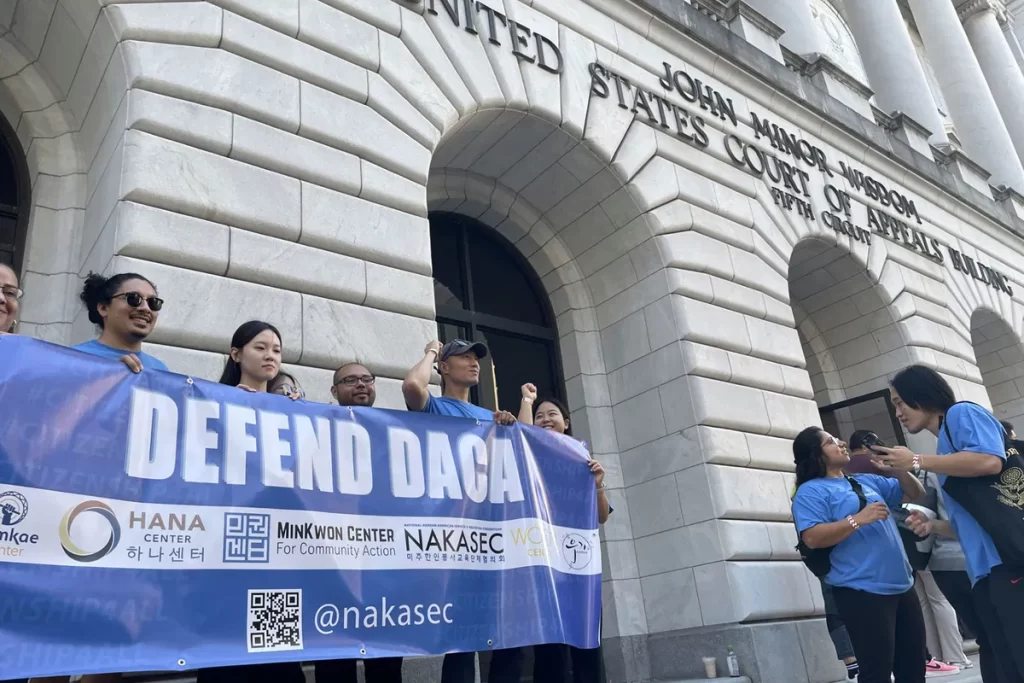Federal Appeals Court Questions DACA’s Future but Considers Partial Continuation
3 min read
Demonstrators supporting Biden Administration efforts to protect immigrants brought to the US illegally when they were children in front of the federal appeals court in New Orleans, October 10, 2024. Kevin McGill/AP
A federal appeals court recently indicated a reluctance to completely overturn a ruling that would dismantle the Deferred Action for Childhood Arrivals (DACA) program, which offers protections to undocumented immigrants brought to the U.S. as minors. During a hearing on Thursday in New Orleans, judges from the conservative 5th U.S. Circuit Court of Appeals expressed skepticism about fully revoking the program, while hinting at the possibility of allowing certain aspects to remain intact.
This hearing is part of an ongoing six-year legal battle concerning DACA, which was established in 2012 under the Obama administration. The program currently protects over half a million immigrants from deportation, granting them work authorization and temporary legal status.
The state of Texas, supported by eight other states, claims that DACA has imposed financial burdens on state resources, particularly in public health care and education. They argue that if the program were terminated, DACA recipients would self-deport, alleviating these costs. However, during the court proceedings, an attorney representing New Jersey—an intervening party defending DACA alongside the Biden administration—highlighted the broader impact of the program. They pointed out that hundreds of thousands of U.S. citizens, particularly children of DACA recipients, depend on their parents’ ability to work and support their families.
U.S. District Judge Andrew Hanen, appointed by George W. Bush, previously ruled to strike down DACA for both current and future beneficiaries. However, he has paused the enforcement of this ruling for existing DACA enrollees while the appeals process unfolds, effectively maintaining the current status quo for those protected under the program.
Following the hearing, Texas Attorney General Ken Paxton, a Republican, expressed confidence, stating that the court appeared receptive to their arguments. He emphasized his commitment to dismantling DACA completely, asserting, “I have fought every step of the way to uphold the Constitution against illegal workarounds and look forward to defeating DACA—in its entirety—permanently.”
The Biden administration, on the other hand, contends that Texas lacks the legal standing to initiate the lawsuit. During the hearing, 5th Circuit Judge Jerry Smith, appointed by Ronald Reagan, indicated that the Justice Department’s arguments regarding standing were not likely to succeed. Nevertheless, Smith demonstrated interest in the Justice Department’s points about a severability clause included in the final DACA regulations established under President Biden. This clause suggests that if a court deems part of a regulation unlawful, it can remove that part while keeping the remainder of the policy intact.
At one point during the hearing, Judge Smith referred to the severability clause as “significant,” indicating a potential ruling that might preserve certain DACA benefits, such as protection from deportation, while striking down other components like work authorization. This would represent a nuanced approach, allowing some form of DACA to survive, even amid ongoing legal challenges.
Judge Edith Brown Clement, also a Republican appointee, raised concerns about the nationwide scope of the original ruling. Her comments reflected a broader apprehension among justices regarding sweeping injunctions that impact entire programs, aligning with recent Supreme Court guidance urging lower courts to be cautious with nationwide injunctions.
The future of DACA remains uncertain as the appeals process continues. The court’s deliberations and potential ruling could have far-reaching implications not only for current DACA recipients but also for the broader conversation around immigration policy in the United States. Advocates for immigrant rights are closely monitoring the situation, emphasizing the importance of DACA in the lives of hundreds of thousands of individuals and their families.
As the legal battle unfolds, the stakes are high. DACA recipients, often referred to as “Dreamers,” have integrated into American society, contributing to the economy and communities across the nation. The ongoing legal discourse around DACA encapsulates a pivotal moment in U.S. immigration policy, reflecting the tension between state interests and the rights of individuals who have grown up in the country.
As the 5th Circuit Court continues to weigh its options, the implications of their decisions will resonate deeply within the immigrant community and beyond. The possibility of a partial continuation of DACA could offer some reprieve, while a full dismantling would signal a significant shift in U.S. immigration policy and its treatment of undocumented individuals who arrived as children. The final outcome remains to be seen, but it will undoubtedly shape the future landscape of immigration rights in America.








